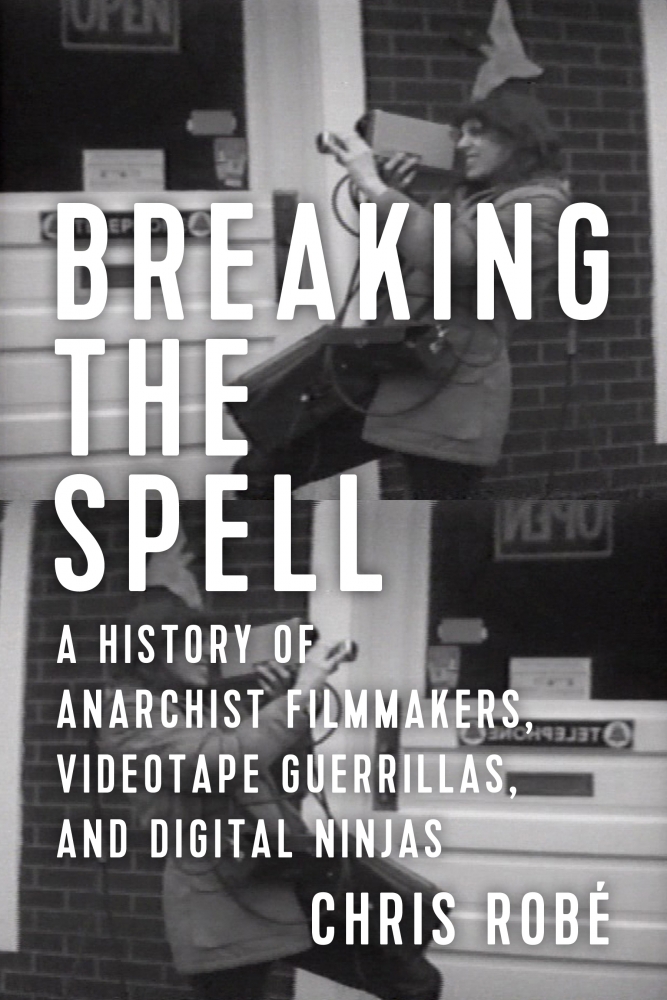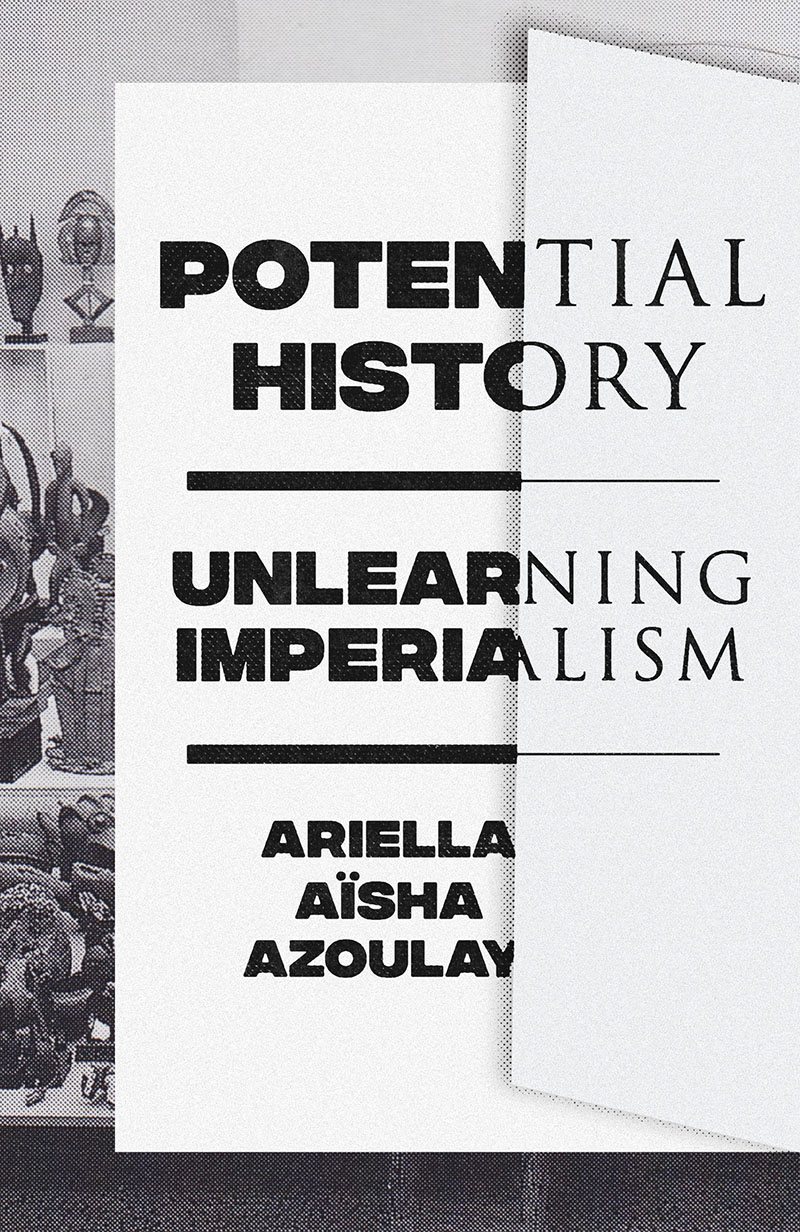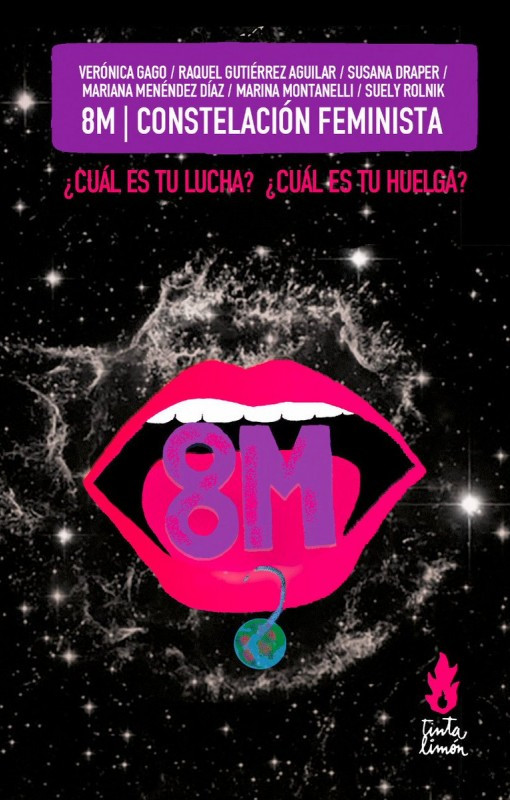Chris Robé: Breaking the Spell: A History of Anarchist Filmmakers, Videotape Guerrillas, and Digital Ninjas (2017)
Filed under book | Tags: · activism, aesthetics, aids, anarchism, autonomy, direct action, ecology, film, indigenous peoples, labour, marxism, media activism, neoliberalism, politics, protest, punk, social movements, strike, third cinema, video, video activism, video art

“Breaking the Spell offers the first full-length study that charts the historical trajectory of anarchist-inflected video activism from the late 1960s to the present. Two predominant trends emerge from this social movement-based video activism: 1) anarchist-inflected processes increasingly structure its production, distribution, and exhibition practices; and 2) video does not simply represent collective actions and events, but also serves as a form of activist practice in and of itself from the moment of recording to its later distribution and exhibition. Video plays an increasingly important role among activists in the growing global resistance against neoliberal capitalism. As various radical theorists have pointed out, subjectivity itself becomes a key terrain of struggle as capitalism increasingly structures and mines it through social media sites, cell phone technology, and new “flexible” work and living patterns. As a result, alternative media production becomes a central location where new collective forms of subjectivity can be created to challenge aspects of neoliberalism.
Chris Robé’s book fills in historical gaps by bringing to light unexplored video activist groups like the Cascadia Forest Defenders, eco-video activists from Eugene, Oregon; Mobile Voices, Latino day laborers harnessing cell phone technology to combat racism and police harassment in Los Angeles; and Outta Your Backpack Media, indigenous youth from the Southwest who use video to celebrate their culture and fight against marginalization. This groundbreaking study also deepens our understanding of more well-researched movements like AIDS video activism, Paper Tiger Television, and Indymedia by situating them within a longer history and wider context of radical video activism.”
Publisher PM Press, Oakland, CA, 2017
ISBN 9781629632339, 1629632333
x+469 pages
Interview with author: The New Architects (video, 2017, 43 min).
Reviews: Beth Geglia (Interface, 2017), Franklin Lopez (Fifth Estate, 2017), Patricia R. Zimmerman (Jump Cut, 2018), Allan Atliff (Anarchist Studies, 2017).
PDF (16 MB)
Academia.edu (author)
Ariella Aïsha Azoulay: Potential History: Unlearning Imperialism (2019)
Filed under book | Tags: · archive, art, care, colonialism, commons, history, human rights, imperialism, israel, museum, palestine, photography, politics, sovereignty, strike, theory, violence, world

“A passionately urgent call for all of us to unlearn imperialism and repair the violent world we share
In this theoretical tour-de-force, renowned scholar Ariella Aïsha Azoulay calls on us to recognize the imperial foundations of knowledge and to refuse its strictures and its many violences.
Azoulay argues that the institutions that make our world, from archives and museums to ideas of sovereignty and human rights to history itself, are all dependent on imperial modes of thinking. Imperialism has segmented populations into differentially governed groups, continually emphasized the possibility of progress while it tries to destroy what came before, and voraciously seeks out the new by sealing the past away in dusty archival boxes and the glass vitrines of museums.
By practicing what she calls potential history, Azoulay argues that we can still refuse the original imperial violence that shattered communities, lives, and worlds, from native peoples in the Americas at the moment of conquest to the Congo ruled by Belgium’s brutal King Léopold II, from dispossessed Palestinians in 1948 to displaced refugees in our own day. In Potential History, Azoulay travels alongside historical companions—an old Palestinian man who refused to leave his village in 1948, an anonymous woman in war-ravaged Berlin, looted objects and documents torn from their worlds and now housed in archives and museums—to chart the ways imperialism has sought to order time, space, and politics.
Rather than looking for a new future, Azoulay calls upon us to rewind history and unlearn our imperial rights, to continue to refuse imperial violence by making present what was invented as ‘past’ and making the repair of torn worlds the substance of politics.”
Publisher Verso Books, London, 2019
ISBN 9781788735711, 1788735714
656 pages
Interviews with author: Jadaliyya (2019), Brad Evans (LA Review of Books, 2020), Sabrina Alli (Guernica, 2020).
Reviews: Ian Wallace (Artforum, 2020), Guy Mannes-Abbott (Third Text, 2020), Louis Rogers (review31, 2020), Stephen Sheehi (Hyperallergic, 2020), Luke Urbain (InVisible Culture, 2020), Lunettes Rouges (Le Monde blog, 2020, FR, part 2), Sascha Crasnow (Field, 2022).
Roundtable: Gil Hochberg, Zoé Samudzi, Joshua Simon, Robert Yerachmiel Sniderman (Protocols, 2020).
HTML (added on 2020-2-2)
EPUB (15 MB)
8M Constelación feminista. ¿Cuál es tu lucha? ¿Cuál es tu huelga? (2018) [Spanish, German]
Filed under book | Tags: · feminism, protest, social movements, strike, women

“?Una apuesta a la política del deseo que sentimos está tomando las calles y qué nos impulsa a pensar la transformación radical como revolución existencial?. En las primeras páginas, Veronica Gago evoca a Rosa Luxemburgo para señalar la creación de pensamiento político desde la huelga.
Ver esta huelga como proceso, como parte de un tiempo de rebelión que recrea la forma de hacer y pensar la política. Este libro es parte de esa praxis, contiene reflexiones vivas de un proceso abierto. Pone en negro sobre blanco experiencias vividas, comparte claves de análisis para mirar este momento de lucha de las mujeres. Desde Argentina, Uruguay, México, Italia y Estados Unidos, escriben Veronica Gago, Mariana Menéndez Díaz, Raquel Gutierréz Aguilar, Marina Montanelli y Susana Draper. Suely Rolnik desde Brasil es entrevistada por Marie Bardet. Todas ellas hablan desde su participación activa y apuestan por pensar desde las luchas.
Los textos parecen una conversación entre las autoras, cada una habla desde un territorio y una realidad con rasgos especificos. Pensar México no es lo mismo que reflexionar desde el Río de la Plata, porque el primero es un país donde existe una guerra contrainsurgente ampliada1, y es en ese contexto donde se despliega la lucha de las mujeres. Sin embargo, de modo sorprendente, encontramos grandes resonancias sur-norte, y fuera y dentro de América Latina. Resaltan como coincidencias, la lucha contra la violencia, perspectivas comunes entorno al trabajo entendido de modo amplio, miradas complejas sobre las dominaciones múltiples.
Es un libro pequeño hecho para la batalla por los sentidos. Útil para organizar conversatorios2, indagar cómo resuena, devolverlo a la lucha, porque de allí nació.”
8M Constelación feminista. ¿Cuál es tu lucha? ¿Cuál es tu huelga?
By Verónica Gago, Raquel Gutiérrez Aguilar, Susana Draper, Mariana Menéndez Díaz, Marina Montanelli, Marie Bardet, Suely Rolnik
Publisher Tinta Limón, Buenos Aires, 2018
ISBN 9789873687372
131 pages
German edition
Translated by Michael Grieder and Gerald Raunig
Foreword by Isabell Lorey
Publisher transversal texts, Vienna, 2018
ISBN 9783903046184, 3903046183
155 pages
Review: Candela Comméres Benejam (Crítica y resistencias, 2018, ES).
Strike website
Publisher (ES)
Publisher (DE)
WorldCat
PDF, PDF (Spanish, added on 2020-11-13)
PDF, PDF, EPUB, EPUB (German)

